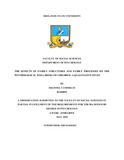Please use this identifier to cite or link to this item:
https://cris.library.msu.ac.zw//handle/11408/3475Full metadata record
| DC Field | Value | Language |
|---|---|---|
| dc.contributor.author | Vandirayi, Shantel | |
| dc.date.accessioned | 2019-03-18T10:23:44Z | |
| dc.date.available | 2019-03-18T10:23:44Z | |
| dc.date.issued | 2018 | |
| dc.identifier.uri | http://hdl.handle.net/11408/3475 | |
| dc.description.abstract | The paper provides a brief overview on the effects of family structures and family processes on the psychological well-being of children. The continuous changes in the demographics of families have had positive and negative effects on the psychological well-being of children. How do family structures impact on a child’s psychological well-being? What are the effects of background differences, family structural change and social environment on the psychological well-being of children? What are the effects of family processes on the psychological well- being of children? How does socioeconomic status affect children’s psychological well-being? The paper tried to answer these questions. Children from two parent family structures have shown to be displaying high levels of psychological well-being in most areas of development than their associates from single parent families. Two theories dominated the study, the family composition perspective which looks in the structure of the families and the family process perspective which looks into the processes of the families. A qualitative research approach was adopted so as to establish an in-depth information in the research understudy. Through careful analysis, the research found that children from two-parent family structures have found to be performing well in their academics because of dual support from both parents. Children from single-parent families have been found to be associated with poor academic performance and poor social relationships. The conclusion drawn from the study show that the two-parent family structures contribute largely to the psychological well-being of children than a single-parent family structure. | en_US |
| dc.language.iso | en | en_US |
| dc.publisher | Midlands State University | en_US |
| dc.subject | Family processes | en_US |
| dc.subject | Psychological well being | en_US |
| dc.subject | Children | en_US |
| dc.title | The effects of family structures and family processes on the psychological well-being of children: a qualitative study | en_US |
| item.languageiso639-1 | en | - |
| item.grantfulltext | open | - |
| item.fulltext | With Fulltext | - |
| Appears in Collections: | Bsc Psychology Honours Degree | |
Files in This Item:
| File | Description | Size | Format | |
|---|---|---|---|---|
| final dissertation.pdf | Full Text | 1.11 MB | Adobe PDF |  View/Open |
Page view(s)
388
checked on Jan 11, 2026
Download(s)
1,328
checked on Jan 11, 2026
Google ScholarTM
Check
Items in MSUIR are protected by copyright, with all rights reserved, unless otherwise indicated.



